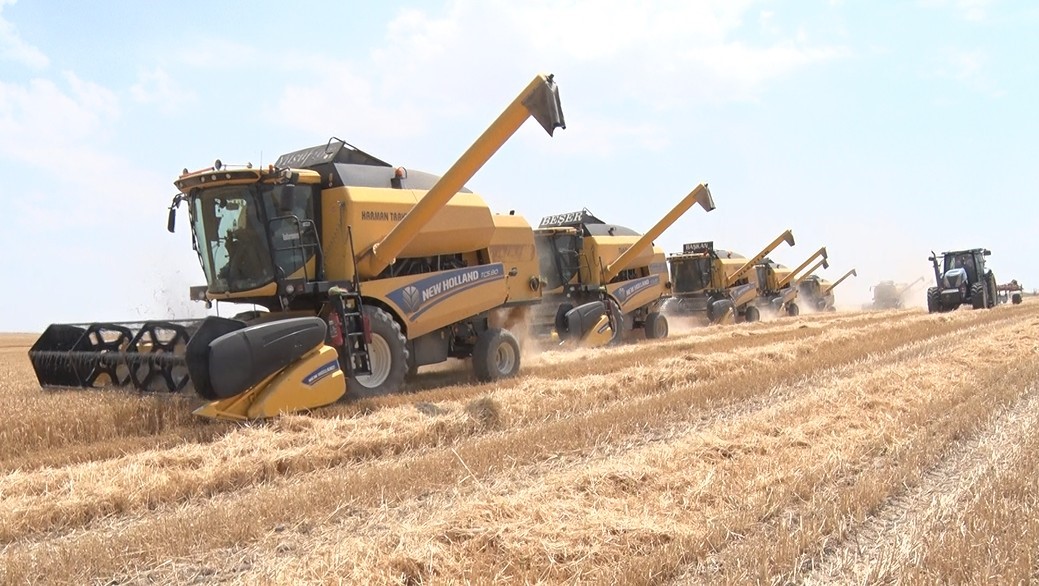Promising harvest despite dry year

Wheat and barley harvesting continues at the Ankara Polatlı Agricultural Enterprise, affiliated with the Ministry of Agriculture and Forestry's General Directorate of Agricultural Enterprises (TİGEM). A 30 percent increase in production is expected this year. The enterprise, one of the regions where the most grain production in Anatolia is achieved, has approximately 211,000 decares of land. Also notable for its certified seed production, including animal husbandry activities, the enterprise planted a total of Tosunbey on 25,569 decares this year, Bezostaja on 18,651 decares, Selami Bey on 1,983 decares, Karakalpak on 210 decares, Reis on 4,025 decares, and Kızıltan-91 durum wheat on 21,401 decares. In addition to these varieties, the Tarm-92 barley variety was also planted on 9,757 decares. The harvest, which began at the end of June, is carried out with 24 combine harvesters and six trucks, supported by 70 workers, including those working in the fields, silos, and threshing floors. The harvest is carried out sequentially by combine harvesters, and the crops are loaded directly onto the trucks and transported to warehouses.
"We expect 20,000 tons of product from 85,000 acres of land."Polatlı Agricultural Enterprise Plant Production Manager Sinan Güre, commenting on the harvest season, stated that grains were planted on 85,000 decares and forage crops on 15,000 decares. He said, "We are continuing this for livestock production. We expect 20,000 tons of product from 85,000 decares of land. Of this, we are producing 15,000 tons for seed production. We have 6 wheat varieties, 1 barley variety, and 1 Hungarian vetch variety. We are serving our Turkish farmers with these products. We currently have two groups of combine harvesters working. Actually, we are experiencing a dry season. Productivity is low for both our Turkish farmers and us. Our barley harvest is over now. We are continuing with the wheat harvest. Despite this dry season, we have an average barley yield of 320 kilos. We aim to achieve an average yield of 250 kilos from wheat. Since we focus on seed production, our planning is determined two years in advance. We evaluate our farmers' demands and develop accordingly. O "That's why our plans include planting barley and Hungarian vetch here. We're primarily adding wheat seeds. We're planting our six varieties proportionately based on demand," he said.
 Our staff are fully competent, conscious people.
Our staff are fully competent, conscious people.Gure continued:
Our certified seed production continues by planting the same varieties in the same plots. Otherwise, variety confusion would result. We also have the latest Sortex system. We perform our selections there. Our silos are state-of-the-art. We have moisture meters and thermometers. Our staff is fully competent and informed. We produce and package our products without any mixing. We deliver them to our farmers through our dealers. We outsource technological know-how every year. We also set a specific yearly standard for combine harvesters. This is to prevent further waste and prevent product loss. We continue to work with combine harvesters that meet these standards. All of our combine harvesters are 2020 models or later.
Güre, noting that harvested products are stored in threshing floors and large 3-billion-ton silos, said, "We have large piles, but the products we put in those piles are sifted, repackaged, and sold to our farmers throughout the year to avoid losses. Most of our products are purchased from TAGEM Research Institutes. One of my favorites this year is our Selami Bey wheat. Despite the dry agricultural conditions, it has stood out a bit more than other products. Of course, no one knows this, but early wheats stand out in dry years. Selami Bey wheat also produces very good yields in dry years and stands out from the rest. We expect a 30 percent increase in yield from last year. We hope to have an even better season next season. Our frost prevention measures are as follows: if you apply top dressing early during the plant's development, when the plant is taller, frost damage will be greater. We evaluate and monitor meteorological data. Therefore, when we apply our spraying and fertilizing programs at the right time, we achieve increased yields." Güre also warned farmers not to neglect their agricultural insurance.
The farm produces approximately 20,000 tons of crop and 15,000 tons of seed each year. The certified wheat seed produced is delivered to farmers, contributing to Türkiye's production chain.
UAV
Reporter: News Center
İstanbul Gazetesi





